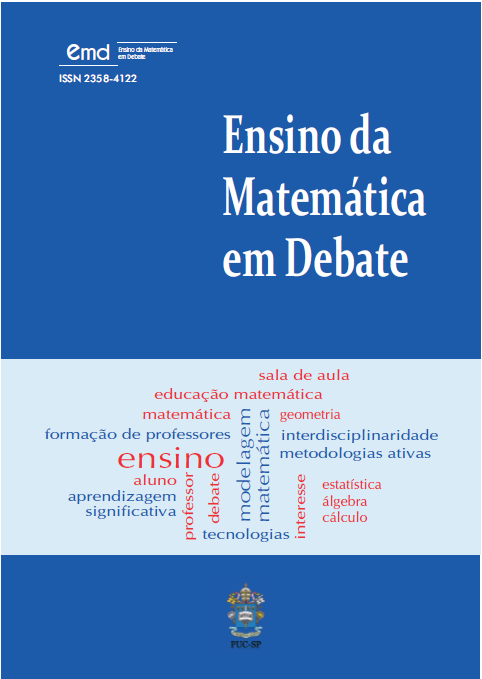ARITHMETIC AND GEOMETRIC PROGRESSIONS
a study on Problem Design and Mathematical Knowledge for Teaching
Keywords:
Mathematics teaching, Problem Design, Initial Teacher TrainingAbstract
This article presents partial results of a research carried out with students of a Mathematics Degree course, with the objective of investigating the contributions of Design or Problems and the Problem Solving methodology for the construction of mathematical knowledge for teaching content of Arithmetic and Geometric Progressions. Ten research questions about the content were proposed to the research participants and applied remotely. The data were obtained through written responses to the activities carried out by the students and recordings of the conversations carried out by means of video conferences. It was concluded that although the undergraduate students present good results with regard to the Problem Solving methodology, they are unfamiliar with the reformulation or redesign of problems, because in their answers there were few changes in the proposed statements. In relation to the construction of mathematical knowledge for teaching related to Arithmetic and Geometric Progressions, it was found that there is evidence of the construction of such knowledge by the undergraduates, although most resolutions are still based on application of formulas.
References
BALL, D. L.; THAMES, M. H.; PHELPS, G. Content knowledge for teaching: What makes it special?. Journal of teacher education, v. 59, n. 5, p. 389-407, 2008.
BRASIL. Secretaria da educação Básica. Orientações Curriculares para o Ensino Médio: Ciências da Natureza, Matemática e suas Tecnologias. Brasília: MEC, 2006.
CRESPO, S. Learning to pose mathematical problems: Exploring changes in preservice teachers' practices. Educational Studies in Mathematics, v. 52, n. 3, p. 243-270, 2003.
FIGUEIREDO, F. F. Resolução de Problemas no Ensino de Porcentagem: em busca de uma compreensão pedagógica a partir dos processos reguladores gerais da teoria de Robbie Case. 2008. 185f. Dissertação (Mestrado em Ensino de Física e Matemática) – Centro Universitário Franciscano, Santa Maria, 2008.
FIGUEIREDO, F. F. Design de problemas com a utilização das tecnologias digitais na formação inicial de professores de Matemática. 2017. 275 f. Tese (Doutorado em Ensino de Ciências e Matemática) – Universidade Luterana do Brasil, Canoas, 2017.
FIGUEIREDO, F. F; GROENWALD, C. L. O. Design de problemas matemáticos com o uso de Tecnologias Digitais sob o enfoque da formulação de problemas subsidiários. Educação, Ciência e Cultura, v. 24, n. 1, p. 221-234, 2019.
LEUNG, S. S.; SILVER, E. A. The role of task format, mathematics knowledge, and creative thinking on the arithmetic problem posing of prospective elementary school teachers. Mathematics Education Research Journal , Springer Netherlands, . 9, n. 1, p. 5-24, 1997.
MAIA, R. J. D. Progressões Aritméticas e Geométricas. 2011. 32 f. Trabalho de Conclusão de Curso (Licenciatura Plena em Matemática) – Universidade Estadual da Paraíba, Paraíba, 2011.
ONUCHIC, L. D. L. R.; ALLEVATO, N. S. G. Pesquisa em Resolução de Problemas: caminhos, avanços e novas perspectivas. Bolema, Rio Claro, v. 25, n. 41, p. 73 - 98, 2011.
POLYA, G. A arte de resolver problemas. Rio de Janeiro: Interciência, v. 2, 1978.
SAVIANI, D. Educação: do senso comum à consciência filosófica. 19. ed. São Paulo: Autores Associados, 2013. 290 p. (Coleção Educação Contemporânea).
SHULMAN, L. S. Those who understand: Knowledge growth in the teaching. Educational Researcher, Washington, US, v. 15, n. 2, p. 4-14, 1986.
SHULMAN, L. S. Knowledge and teaching: foundations of a new reform. Harvard Educational Review, Harvard, v. 57, n. 1, p. 1-22, 1987.
SMOLE, K. C. S. ; DINNIZ, M. I. Ler e aprender Matemática. In: SMOLE, Kátia C. S.; DINIZ, Maria Ignez (Orgs.) Ler escrever e resolver problemas: habilidades básicas para aprender Matemática. Porto Alegre: Artmed, 2001.
STOYANOVA, E.; ELLERTON, N. F. A framework for research into student’s problem posing in school mathematics. Technology in mathematics education. In: Proceedings of the 19th annual conference of the Mathematics Education Research Group of Australasia (MERGA). 1996.
TICHÁ, M.; HOSPESOVÁ, A. Developing teachers’ subject didactic competence through problem posing. Educational Studies in Mathematics, v. 83, n. 1, p. 133-143, 2013.
Downloads
Published
How to Cite
Issue
Section
License
Copyright (c) 2021 Ensino da Matemática em Debate

This work is licensed under a Creative Commons Attribution-NonCommercial 4.0 International License.

Este obra está licenciado com uma Licença Creative Commons Atribuição 4.0 Internacional.






